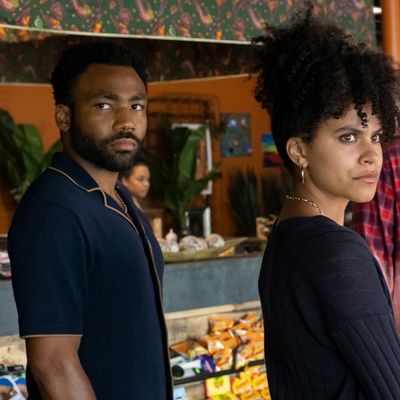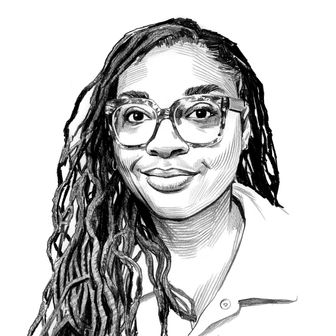
It’s the end of an era. Donald and Stephen Glover’s acclaimed series has reached its conclusion, and I’m truly satisfied with the journey. This series will live on in a lot of people’s hearts, and this finale, “It Was All a Dream,” solidifies its permanent place in Black culture. The trio of men we met as they were muddling through day-to-day life in Atlanta with vague dreams of the future have gone from sitting on a discarded couch in an abandoned field to sitting on quality furniture in Al’s modern apartment.
The episode opens with Darius watching Judge Judy on Al’s couch while Earn and Al chat. They invite him to tag along on their plans for the day, but he informs them of his upcoming appointment at a sensory-deprivation tank. So they go their separate ways with Al and Earn meeting up with Van to dine at Atlanta’s very first Black-owned sushi restaurant, created by a man who studied under a real sushi master in Japan and brought his knowledge back to create Black sushi fusion. Located in an abandoned Blockbuster (which seems like setting yourself up to fail), the restaurant is an amalgamation of corner store, hood eatery, and sushi lounge. There are shelves of candy, lip gloss, and durags for sale by the register. When Al needs to use the bathroom, he’s given a key and directed to the nearest Rainbow. They’re served hot white Hennessy instead of sake as rap music plays. Immediately, Earn, Al, and Van are distracted by the Popeyes across the street, which sounds more appetizing than whatever they’re about to experience.
Although the restaurant goes all out to accommodate them — Demarcus, the eccentric owner, is a big fan of Paper Boi — none of the Black-Japanese fusion dishes go over well. (Van complains that the rice has corn in it.) Al continues to suggest Popeyes, but Earn wants to stay. Al points out that the chef is making the sushi rolls with his bare hands, and Van chimes in that the fish is raw but warm. This is the last straw for Al, who takes the bathroom key and makes his way to Rainbow. When he returns to his friends, he starts to leave but the waiter urges them to say because they’ve made the chef’s special: blowfish, a rare Japanese delicacy that must be cut by a specially trained chef because the skin and liver are poisonous. This is too far for all of them, and as they head out the door, Demarcus confronts them, correctly intuiting their Popeyes run.
Demarcus embarks on a monologue about his quandaries surrounding Black culture. Dissatisfied with the reception of his restaurant, he explains the cold embrace and double standards he’s encountered from the community. Recalling the premiere of Queen & Slim at the nearby theater, he tells Earn, Van, and Al that the restaurant was filled with Black people “hopped up on nationalism” who came to support a Black business, but the blowfish went untouched, and there were multiple reviews saying he was serving poison. He describes how traditional sushi chefs prepare the food with their hands and serve it at room temperature — but “if a brother from Alabama does it the same way, suddenly the fish is dirty.” Annoyed that his brainchild will never surpass Popeyes’ popularity, he calls the chain a modern-day Coon Chicken with a fake Aunt Jemima–esque spokesperson conjured to distract from the fact that it’s owned by an Italian man and his family. Al says he understands Demarcus’s frustration but still refuses to eat the blowfish, prompting Demarcus to sneer, “What, you want some hot sauce to go with it, brother?” Then he urges them to look at the young Black boys outside the Popeye’s as they do stupid teenager shit, telling them, “That’s our future. Salted and battered being sold back to us in our own image.” Demarcus believes this is because we don’t trust each other and “we’ve been told time and time again the only person you can trust is yourself.”
There’s so much truth and thoughtfulness to this entire exchange, and I can feel the Glover brothers’ exasperation in every line. Atlanta is in many ways this restaurant: the art of high-quality television infused with Black culture. Donald is undeniably a craftsman, and this work was birthed to honor both his craft and Black culture, but his biggest critics are often fellow Black people. I’m not the biggest fan of the soapbox-y delivery, but I hear what he’s trying to say: Black people too often fall into the consumerist trap white supremacy plants for us. It’s something that frustrates me as well, but what’s missing from this conversation is the systemic ways we’ve been brainwashed; instead, it’s framed in a “Niggas are gonna be niggas” thought process. This could have been an opportunity to speak with the Black community, not at us. However, I agree with the sentiment, and I believe a lot of Black art is overlooked by our own people because we’ve been socially conditioned to avoid fully interacting with our culture in an intellectual way.
But Atlanta is much bigger than that sushi restaurant; the most obvious difference is that Atlanta is actually good. It’s one of the only contemporary television shows that presented us with organic, natural Blackness. (One fan of the show accurately described it as the Glovers’ chance to create stories that celebrate random, sometimes mundane Blackness, not just Black exceptionalism.) With the exception of last season, which at times felt as if it was explaining the Black experience to white audiences, Atlanta is a show made for us. And I believe this whole season proves it.
But Atlanta couldn’t end by wrapping itself in a nice bow with a straightforward message; that would go against its Afro-surrealist nature. The show uses its most eccentric character to disrupt the reality of Earn, Al, and Van’s day. Before going to his appointment, Darius goes to the pharmacy to pick up a prescription. While waiting for the pharmacist to find his medication, he meets a woman who overhears that he’s going to a sensory-deprivation tank and shares that she started going about a year ago. She said she had to stop because the visions in the tank were becoming too intense. Darius shares that his trick to staying anchored is “thick Judge Judy,” meaning if he sees Judge Judy on the television and she’s thick, then he knows he’s in the tank.
As he walks to his appointment, London, an old friend from Darius’s heavy partying days, runs into him and insists on giving him a ride so they can catch up. She clearly remains very much in the party lifestyle and offers him some of her weed. He reluctantly smokes with her (he usually doesn’t smoke before his sessions) and then asks for a sip of water only to find out it’s actually vodka. Just as she’s telling him she’s been “macrodosing” all day, they’re pulled over by the cops because of her car tints. This isn’t London’s first rodeo, and she hilariously aces her sobriety test after chugging the whole water bottle of vodka … then steals the cop’s gun, drives away, runs over someone, flees the car, and leaves Darius with the gun. He abruptly wakes up choking in the tank, and the attendant weirdly suggests he calm down in the tea room, which is filled with white women who speak in circles about drinking tea in the tea room. Freaking out, Darius screams for them to wake up and gets kicked out.
Next, Darius arrives at what seems like a random home and is greeted by a young Black man around his age. Their exchange is somewhat awkward, but there’s clearly a deep love between the two. He offers Darius a bowl of jollof, and while he’s waiting for the rice, Darius picks up some of the photographs in the house, revealing that he’s with his brother. He looks at the TV and notices a thick Judge Judy, then wakes up again in the tank. This cycle continues until he’s finally able to meet up with Earn, Al, and Van at the sushi restaurant and save them from Demarcus, who, at the end of his speech, was planning to lock them in. Darius tells them to hop in his pink Maserati, and they speed off, doing donuts and grabbing Popeyes on the way back to Al’s.
They finish the meal on the sofa and Al asks where the car came from. Darius says he stole it, but it doesn’t matter because he’s still in the tank. Earn tells him he’s tripping and he’s really there and they’re really his friends, but Darius proposes that maybe it was all a dream and they’re just in it and always have been. Earn, Al, and Van ignore Darius and go outside to smoke, leaving him alone in the living room. He watches his friends happily for a moment before turning to the TV to catch Judge Judy. We never see if she’s thick or not, but does it really matter?
The series ends beautifully, and incredibly Black, with “The Song Is Familiar,” by Funkadelic, playing us out.
Atlanta After Hours
• I about screamed when I saw Cree Summer as the woman whom Darius met at the pharmacy. Talk about a Black legend! We owe Summer so much for the roles she’s given us — from the slew of cartoon characters I don’t have room to name (Numbuh Five from Codename: Kids Next Door is my favorite) to Freddie on a Different World, she’s the perfect cameo to end the series.
• While Darius is in the pharmacy talking to Summer’s character, he asks if she’s there for anxiety medication, hinting that’s the reason he’s there himself. Though she’s there for antibiotics, she says she has dealt with anxiety in the past, and the advice she gives him is lovely: “I think I was trying for a long time to look at this world as a battle, and in some ways, it is. But I’m a part of this world, too … I’m allowed to dance in it how I want to. As a matter of fact, I demand that I do.” I think every Black person should hear this. We deserve to dance.
• I hate to say it, and you can drag me for it, but all I know is that tomorrow I’m getting a chicken sandwich from Popeyes!


